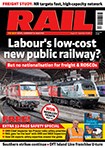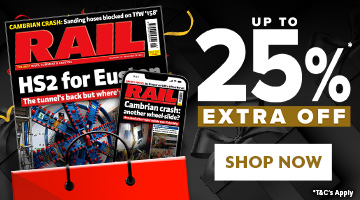OK, here we go. With Labour leader Jeremy Corbyn’s #traingate kerfuffle still raging, I have no alternative but to write about this surreal political story. I do so in the full knowledge that hardcore Corbyn supporters will start flaming me again. Whatever. I’ve lost count of the rude and offensive names I’ve been called this last couple of days by those who refuse to believe that Corbyn is capable of dissembling, let alone lying.
Ah. The ‘L’ word. This is to be used as a last resort, when it is unequivocal. It is no ordinary word. You do not use it as you would the rest of the vocabulary. It’s a linguistic ‘nuke’, a weapon of last resort. It really ought to come with twin-key authorisation before you deploy it, for its mega-ton after-effects are invariably toxic, quite possibly fraught with legal dangers, and shot through with anger. Once the ‘L’ word is used, all hell breaks loose.
As #traingate gathered strength on the afternoon of August 23, Corbyn was accused on social media of ”..utter incompetence and bare-faced lies,”... “straight talking, honest lying,”......plus an observation that “straight talking honest politics is a lie” ....and they were just three verdicts from high-profile Labour figures! The first comment was from actress Frances Barber, the second from former Labour Rail Minister/Glasgow South MP Tom Harris and the third from Labour MP Jess Phillips. I never thought I’d see the day when such high-profile and sincere figures pointed fingers at their own party leader and unleash that last-resort nuclear accusation: “Liar!”
It’s extraordinary, unprecedented and deeply worrying. And it is certainly relevant here, because the railway’s future is too important, too expensive and too fraught with existing complications to be hurled into this seething political maelstrom. But we are where we are, so what actually happened is important.
And the facts of the matter seem to be these. On August 11, Corbyn’s party boarded the 1100 King’s Cross-Newcastle, seemingly on rather expensive last-minute tickets. If Corbyn’s office had booked advance tickets, they would have come with automatic seat reservations and none of this would have happened. CCTV subsequently released by Virgin shows the Corbyn party at 1107, walking past unoccupied and unreserved seats in Coach H and then reserved but unoccupied seats in Coach F, before occupying a distant vestibule to shoot the now infamous video criticising the industry for overcrowding and urging nationalisation. This reportedly took around a half hour, after which Corbyn took up a seat in Coach H, around 45 minutes into the journey .
It simply wasn’t true that there were ‘no seats’. Oddly, there was silence from Corbyn for several hours, then his story kept changing, as even Labour leadership contender Owen Smith pointed out. There were no seats; there were seats but none together; there were seats but they had luggage on them. Smith made it clear that Corbyn was not forced (as he claimed), but chose to sit on the vestibule floor. Far from being some kind of establishment/media conspiracy, Corbyn’s most vociferous critics were from his own party. Other critics moved quickly from irritation at perceived deception to mockery - and it is arguably more damaging for a politician to be laughed at than criticised. When integrity evaporates then credibility inevitably follows.
On August 24, Corbyn was tetchy and sneering when Sky reporter Darren McCaffrey tried to question him. We had the bizarre spectacle of a major party leader using a video stunt to promote a debate about rail and nationalisation which he then refused to participate in. Notwithstanding the unfailing support of Corbyn’s fans, the wider electorate will draw its own conclusions.
Suggestions that there was some sort of conspiracy, or that Sir Richard Branson is “absolutely petrified” by Corbyn, are risible. But the real worry is that daft distractions like this mask some truths about nationalisation which need to be aired and discussed.
The two biggest criticisms you often hear about the railway are that it is overcrowded and that fares are too high. I agree. But nationalisation will make these problems worse. It is already the Government that is responsible for high fares - either through its regulated fares formula, or through franchise agreements which the Treasury sees as cash cows. And it is Government which has forced the passenger to pay half as much again as he or she used to compared with the taxpayer, who has paid 50% less since 2008. Where once it was 50/50, now passengers pay 75% of fares and Government 25%.
Nationalisation would pave the way for this process to accelerate when a reversal is ideally needed. Not once have I heard any politician campaign for low fares to even mention this. Also, contrary to public opinion, train operators make a slender 2% profit and as Philip Haigh has shown, many operators do not pay a dividend to shareholders. Government already controls all these crucial financial matters, so nationalisation would change absolutely nothing.
Worse, those who campaign to ‘Bring Back BR’ should be careful what they wish for. BR’s most frequently-used capacity management tool was to hike fares by more than inflation to keep people off trains. On modernised routes fare increases were even higher. The ‘Bring Back BR‘ campaign beggars belief.
Do you also want to bring back BR’s service frequency on the East Coast and Southern routes? You do? Excellent! Let’s slash train frequency on both routes by at least 50%! Yes, you’d cut roughly half of today’s King’s Cross-Newcastle long-distance or Brighton-London commuter services. See what that does for train overcrowding - but hey, it would solve Network Rail’s line capacity problem.
That is why I have such contempt for cheap stunts such as that pulled by Jeremy Corbyn - such cynical political game-playing masks the real issues, compromises essential discussion about major problems, and makes their solution less likely and costlier because more heat and little light are the only outcomes. Passengers deserve better? You bet they do.
This has backfired even in narrow political terms. Whatever good they did, politicians are remembered for one or two things. John Major? The affair with Edwina Currie. Tony Blair? Iraq. Gordon Brown? Bolton’s Gillian Duffy. Nick Clegg? Tuition fees. I rather suspect this will be Jeremy Corbyn’s albatross.
I commend Sir Richard Branson for having the cojones to go out proactively to defend his brand and the railway. The railway needs to pursue much more of this kind of engagement, not only in response to ‘events’ but also behind the scenes. Otherwise, nonsense notions will continue to inform the public view that nationalisation is a solution.
The railway needs to do what Sir Richard did - get out there, make the case, tackle ‘BS’ wherever it crops up and really fight for rail.
Comment: RAIL 808: August 31 2016 - September 13 2016













Comment as guest
Comments
No comments have been made yet.